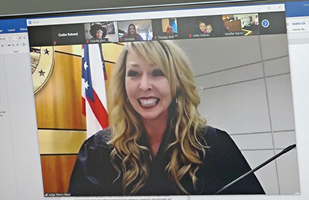Cyber Celebration: Drug Court Holds First Virtual Graduation

Lorain County Family Drug Court Judge Sherry Glass was all smiles during her first remote graduation.

Lorain County Family Drug Court Judge Sherry Glass was all smiles during her first remote graduation.
As millions of Ohioans isolate to combat the spread of the coronavirus (COVID-19), a Lorain County drug court found a unique way to recognize a woman who survived the solitude of substance use disorder.
The Lorain County Family Drug Court recently organized its first-ever remote graduation ceremony through videoconferencing. The graduate, a mother of four who asked for her name not to be published, completed the yearlong program on her second attempt after an unsuccessful try last year.
She thanked Lorain County Domestic Relations Judge Sherry Glass, who presides over the specialized drug court docket, for “not giving up on me, and encouraging me to move forward.”
“We were not going to let COVID-19 slow us down. We were not going to let the progress of this program, and your progress be slowed down, at all,” Judge Glass told the woman.
The court, which began in 2000, helps parents who are battling substance use issues with the motive of reunifying, or having parents remain, with their children. The effort is comprised of several organizations, including the court, multiple other legal entities, Lorain County Children Services, treatment providers, and other community partners.
Typically, the drug court’s graduation ceremonies are a social gathering accompanied by cake, hugs, and handshakes. But given the present need for social distancing, organizers had to come up with an alternative way to acknowledge the important achievement, not only for the graduate, but also as an aspiration for fellow participants.
“They need to know we will not put them on pause, especially during unprecedented hard times when they need us the most. We hope by the team going the extra mile, our participants got the message: They are worth it,” Judge Glass said.
The court says they try to limit the number of participants to around 10, so the program’s case manager and clinicians can have more time to give each participant the maximum amount of support. With 62 graduates who’ve successfully completed the program and left the docket, that aid continues even after they’ve left the drug court.
“They have the gift of our word,” Judge Glass said. “When they walk out of those doors, if they need me, if they need the court, we are always there for them.”


